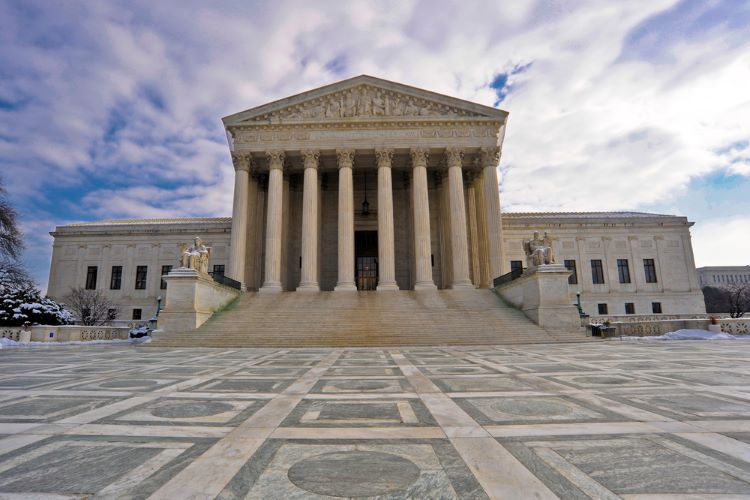Does SCOTUS decision in 'Trump too small' case show 'rifts in the originalist consensus'?

The U.S. Supreme Court ruled Thursday that the U.S. Patent and Trademark Office did not violate the First Amendment rights of a trademark applicant when it refused to register the phrase “Trump too small.” (Image from Shutterstock)
Updated: The U.S. Supreme Court ruled Thursday that the U.S. Patent and Trademark Office did not violate the First Amendment rights of a trademark applicant when it refused to register the phrase “Trump too small.”
The Supreme Court upheld a provision of the Lanham Act that bans registration of trademarks that contain the name of a living person absent that person’s consent.
Justice Clarence Thomas wrote the opinion for the high court. Six justices wrote or joined concurrences.
Thomas said some justices differed over analysis, but all agreed that the names clause of the Lanham Act does not violate the First Amendment.
“On the bottom line, there is no dispute,” he said.
But Tom “T.M.” Wolf, a Supreme Court expert at the Brennan Center for Justice at the New York University School of Law, stressed the differences in a thread on X, formerly known as Twitter. The various opinions are “more signs of rifts in the originalist consensus,” he wrote.
The applicant, California attorney Steve Elster, sought to trademark the “Trump too small” phrase for T-shirts and hats following “a memorable exchange” at a 2016 Republican presidential primary debate, according to a brief filed by his lawyers. The phrase was also intended to express Elster’s view about “the smallness of Donald Trump’s overall approach to governing,” the brief said.
During the debate, then-candidate Trump addressed Florida Sen. Marco Rubio’s campaign-trail jokes about Trump’s hands being small for his height. Rubio made the jokes in response to Trump’s “Little Marco” moniker for him.
During the debate, Trump said Rubio had referred to the size of his hands while suggesting that, if they are small, “something else must be small.”
“I guarantee you there’s no problem,” Trump said.
Only Justices Samuel Alito and Neil Gorsuch joined Thomas’ opinion in full. Although the other justices agreed that there was no First Amendment violation, there was disagreement over Thomas’ history-and-tradition test.
Thomas said the names clause—a viewpoint-neutral, content-based restriction on speech—is consistent with the First Amendment given its “deep roots in our legal tradition.” A different approach may be needed, he said, if a trademark case reaches the court with a content-based trademark restriction without a historical analogue.
Justice Amy Coney Barrett questioned the history-and-tradition test in a partial concurrence joined by Justice Elena Kagan and joined in part by Justices Sonia Sotomayor and Ketanji Brown Jackson.
“The court never explains why hunting for historical forebears on a restriction-by-restriction basis is the right way to analyze the constitutional question,” Barrett wrote in a portion of her opinion joined by all three liberal justices.
“In my view, such restrictions, whether new or old, are permissible so long as they are reasonable in light of the trademark system’s purpose of facilitating source identification,” Barrett said.
In his thread on X, Wolf noted that Chief Justice John Roberts and Justice Brett Kavanaugh backed Thomas’ focus on history but said in their concurring opinion a “historical pedigree” might not be necessary.
The lineup means some combination of three conservative justices—Roberts, Kavanaugh and Barrett—“aren’t necessarily going to go along with ‘history and tradition’ every time,” Wolf wrote.
The case is Vidal v. Elster.
Hat tip to SCOTUSblog.
Updated June 13 at 3:40 p.m. to add comments from Tom “T.M.” Wolf.



